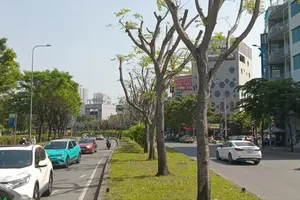
From the moment the accident happened, the public anxiously followed every development. Concurrently, families of the victims began sharing cherished photos and poignant stories of their loved ones, memorials that naturally drew widespread attention, garnering thousands of emotional comments and shares.
It was this intense focus on a heartbreaking event that certain accounts chose to exploit, publishing fabricated information that deliberately twisted the knife in the wounds of the victims’ families.
Roughly a day after the incident, a page named M.C Online began publishing a series of posts featuring heart-wrenching, albeit entirely fictional, narratives about the victims. Stories of an outstanding student on a reward trip from his parents, a lifelong driver who had painstakingly saved for a family vacation to Ha Long, and the supposed last words of those adrift at sea were circulated. These posts were accompanied by a flood of images, a mix of actual photographs and AI-generated pictures.
The online community, however, swiftly debunked these stories as complete fabrications. One photo, in particular, drew significant attention; it depicted a group of children playing on a boat deck in Ha Long, captioned to identify them as victims of the tragedy.
The truth wasn’t long in coming out. The original photographer came forward, posting the source photos and clarifying that they were personal family pictures from a trip in August 2024, entirely unconnected to the accident. For his family, the consequences were severe. “The misattribution of our photo caused serious disruption to our lives”, he explained, “with countless worried relatives calling and visiting our home to check on us.”
Despite being proven false, these narratives had already captured the belief of many. Some users went so far as to share the fabricated content as if it were verified news. In a high-profile example, singer Thai Thuy Linh was compelled to issue a formal public apology for having shared misinformation related to the Ha Long Bay boat accident.
A common thread runs through the accounts that exploit these stories of loss and sorrow. They almost always feature baiting comments. Phrases like “I have the victim’s video on my page”, “I have photos of the victims”, or “I was a witness, it was absolutely heartbreaking” are typical.
The primary objective of these posts is simply to “fish” for reactions, comments, and shares. These content creators will stop at nothing to provoke an emotional response – be it grief, anger, or morbid curiosity. A click on their link, a read of their post, is counted as a success.
It’s a strategy that plays directly into the algorithms of social media platforms. Accounts with high engagement rates are rewarded with greater visibility and reach on subsequent posts. Consequently, once these accounts have “farmed” a sufficient level of interaction, the creators can erase the original posts and sell the high-reach page or use it for profitable advertising.
The fallout from such actions extends beyond sowing public confusion. It inflicts profound secondary trauma on the victims’ families, who are already grappling with immense pain. It also complicates the work of investigators, rescue teams, and authorities trying to maintain public order.
The recent action by the Quang Ninh Provincial Police to penalize an individual for spreading false information about the accident underscores the severity of the issue and the critical need for information control.
The damage doesn’t stop at the ethical boundary; this wave of misinformation is also inflicting serious harm on the tourism industry, a sector still in fragile recovery post-pandemic. In the days following the incident, a palpable sense of apprehension has settled over the industry, with many tourists reportedly hesitating, postponing, or outright canceling their tours. The atmosphere is now markedly more subdued than what was forecast for the peak season.
“The chaotic information posted online has had a direct psychological impact on customers”, stated Chairman Pham Ha of Lux Group, a company specializing in luxury cruise tours. “It’s causing many businesses to flounder, even those with absolutely no connection to the incident.”
At the end of the day, this incident serves as another harsh reality check. Social media cannot be a responsibility-free zone. The casual sharing of unverified information is actively eroding social trust.
In an age where anyone can be a “reporter”, it is more crucial than ever for each individual to recognize the profound ethical and legal responsibilities that come with that power. It's simply not good enough to make a mistake and then apologize. The ability to disseminate information is not just a privilege; it is a duty that demands careful consideration before every post and every share.
























